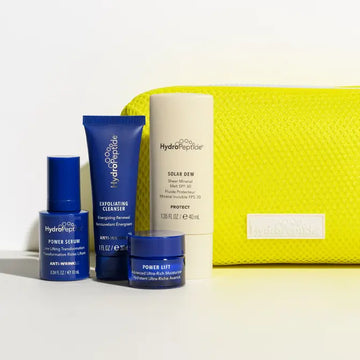
Getting to Know Your Skin: What Type of Skin Do I Have?
Share
While all skin types and tones typically follow the same basic skincare regimens of cleansing, moisturizing, and applying sunscreen, there are certain nuances that apply to specific skin types. Plus, it’s important to know your skin type before you purchase skincare products. We spoke to New York City board-certified dermatologist Dr. Nava Greenfield about how best to determine your skin type.
Why Is It Important to Determine Your Skin type?
Before you spend any more time trying to figure out your skin type, you will probably want to know the payoff behind it. “Your skin type will determine the skin products and ingredients you choose to use. You want to tailor your skin care regimen to your specific skin type to get the best results,” explains Dr. Greenfield. In other words, using the wrong skincare products may result in a waste of time and money and perhaps even lead to irritation and discomfort of the skin.
The Quickest Way to Determine Skin Type
On the most basic level, it’s easy to determine skin type by visual examination. Dr. Greenfield says that “oily skin will appear shiny with prominent and enlarged pores while dry skin will appear scaly and feel rough.”
Is there a way to tell if you have: Oily, dry, combo or sensitive skin?
According to Dr. Greenfield: Most people have combination skin. If your skin appears rough and scaly, you’re likely to have dry skin. If it appears shiny with enlarged pores, that is an indication that you have oily skin. If you have excess sebum in certain areas of the face but dry rough skin in other areas, your skin is combination and if your skin turns red, itchy, and uncomfortable after application of skin care products you likely have sensitive skin. “Most of the time, a patient will know they have sensitive skin and will be able to tell that to me before I even have to explain it to them because it is their lived experience,” says Dr. Greenfield.
Determining Skin Type Using the Skin Cleansing Method
The “skin cleansing method” is a simple way to figure out if your skin is dry, oily or combination. Cleanse your skin and wait 30 minutes. If your skin feels tight after those 30 minutes have passed, you most likely have dry skin. If your skin has a shine to it, you likely have oily skin. If your skin feels tight in some areas but appears shiny or oily on other parts, you are most likely a combination skin type.
Determining Skin Type Using the Oil Blotting Method
Another easy way to determine your skin type is with the oil blotting method. Find an oil-blotting paper (if you don’t have oil-blotting papers, a thin sheet of paper can still work) and press it on the different areas of your face. After blotting the T-Zone area, hold the paper to the light. If you see oil, then you either have oily skin or combination skin, depending on the results of the other areas on your face. Repeat the same step on the cheeks. If you do not see oil on the paper from the cheeks and the T-Zone, you have dry skin. If both areas are oily, then you have oily skin. If the T-Zone is oily and the cheeks are not, you have combination skin.
Dealing with Sensitive Skin Types
Any of the three major skin types can also be sensitive. When you have sensitive skin, your skin reacts more easily to irritants and allergens. You will notice redness on the skin more frequently. Here are other ways to know if you have sensitive skin:
- You breakout in rashes frequently
- Your skin is prone to sunburns
- Skincare products sometimes sting when you use them
- Your skin has a tendency to feel itchy
- Your skin has visible blood vessels (capillaries) on the face
With sensitive skin, it’s very important to stay away from any skincare products containing parabens, phthalates, sulfates or artificial fragrances.
Discover the products from HydroPeptide created specifically for sensitive skin.
The Best Skincare Products for Each Skin Type
As a general rule of thumb dry skin types should be using gentle, non-lathering cleansers and thicker facial creams that help to replace and protect the skin barrier. Additionally, antioxidant serums and sunscreen are musts for dry skin.
Try: HydroPeptide products for dryness and dehydration.
Oily skin should use products with glycolic acid, salicylic acid, hyaluronic acid and peptides to help even out skin tone and unclog pores, while still keeping skin hydrated. Again, sunscreen is a must!
Try: HydroPeptide products for oily skin and enlarged pores
Combination skin can be handled like dry skin in the winter and oily skin in the summer. Therefore, it may take some practice to figure out the best products for your combination skin.
HydroPeptide products are clinically formulated with ingredients that benefit all different skin types.
